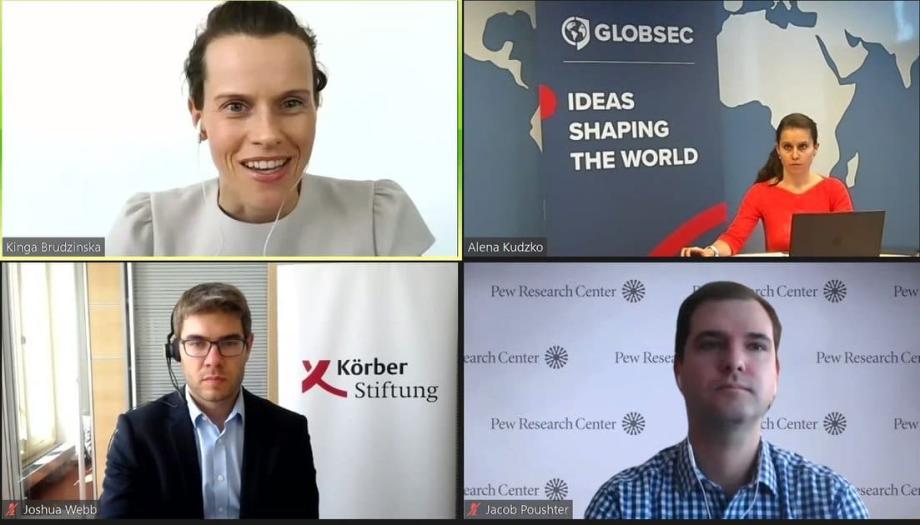Unanswered questions on Transatlantic Relations

Future of Transatlantic relations seen through the eyes of Americans, Germans, and Central Europeans, from foreign policy perspectives, China’s role on the global stage, defence spending on both sides of the Atlantic and the COVID-19 impact on the above-mentioned topics were the main points of discussion during the virtual briefing hosted by GLOBSEC, Pew Research Center and Körber-Stiftung on 14 July.
There was an overall agreement that we are living in times when the global balance of power is being rapidly shifted. Despite the fact that the US is still perceived as the leading economic power by the majority of people, China, in the eyes of Europeans, is increasingly seen in a more positive light as a trade partner. Russia’s global standing, on the other hand, seems to be diminishing significantly, even for Central European countries.
“Americans and Germans diverge consistently on their perceptions of bilateral relations” - Jacob Poushter, Associate Director of Global Attitudes Research, Pew Research Center
- Overall Americans are more optimistic than Germans on their view of bilateral relations, however, there is an increasing divergence of attitudes, with Germans’ confidence on US Presidency sharply decreasing since 2016, moving from 86% to 11%
- 66% of Americans give Germany high ratings for their corona-crisis response. In general, there is also a wider partisan gap between the Democrats and Republicans in evaluating how countries, in general, have dealt with the pandemic, with a gap of 44 per cent
- Regarding Globalization, Germans are more optimistic that in a post-COVID scenario there will be an increase or a return to normal cooperation among countries, with an agreement of almost 60%. Whereas, public opinion in the US is more divided: 35% of Americans think countries will cooperate more, 34% believe there will be a return to normal and 29% want the focus to be more on national interests. However, young and educated Americans have demonstrated the most optimistic views (60% of college graduates think globalization is a positive aspect).
- Fewer Americans, since the beginning of the Trump administration, are in favour of an increase in European defence spending: from 45% in 2017 to 35% in 2019. On the other hand, the Germans’ opinion is more diversified with a growing perception that Germany should rely less on the US for security issues. However, still, 52% of Germans think the US military bases in their territory are somewhat or very important.
“Transatlantic relations are in crisis: two out of three Germans think they are bad or very bad” - Joshua Webb, Editor, The Berlin Pulse, Körber-Stiftung
- Only 20% of Germans look at the United States as the most strategic partner today, whereas in 2015 the results were of almost 60%, a sharp decrease.
- The coronavirus pandemic has exacerbated this trend: indeed, there has been a deterioration of US perceptions by Germans of 73%. The underpinning reasons should be distinguished between presidential and structural causes. On one hand, almost the majority of Germans have a negative view of President Donald Trump and the consequences of his reelection for the US-German relations: 87% of Germans perceive this possibility as rather or very negative.
- In Germany, on the other hand, there is also a structural lack of strategic thinking and understanding of transatlantic relations. This structural phenomenon is increasing anti-American sentiments and draws less attention to transatlantic relations as a strategic alliance and asset for foreign policy issues. This attitude is portrayed also from the nuclear security viewpoint, with only 22% of Germans willing to continue with the US nuclear protection.
- 52% of Germans would support an increase in defence expenses if this would mean more autonomy and independence from the USA.
- A quite significant remark is that 31% of Germans wish for a neutral foreign policy in the future, even though the majority (55%) would like to remain West-oriented.
“When we talk about transatlantic cooperation, I believe we need to make a generational bet and focus on the topics of climate and technology and then extrapolate them to different areas” - Alena Kudzko, Director, GLOBSEC Policy Institute
- There is a lot of discussions whether countries will become more inward-looking or there will be more international cooperation after the crisis, and it is promising to see that Germans are more open to cooperation.
- It is remarkable to point out China’s rising profile in Central Europe, with 67% of Slovaks believing that China has helped more than any other country during the pandemic. A trend that is however different from country to country, with China’s image being overplayed for the majority of people now.
- The United States has always been perceived as a positive ally in Central Europe, particularly because of historical reasons. Notwithstanding this image, the public opinion is now changing, moving more towards neutral foreign policy thoughts, increasing the perception that the US is no longer the uncontested leader. This view could be motivated by the weakening of the US’s soft power.
- A post-COVID-19 scenario could see Germany as the main protagonist in international cooperation in several areas, for example in the health, climate and technology realms.
by Lucrezia Scaglioli, Trainee, Europe’s Team, GLOBSEC
This event was hosted within the framework of GLOBSEC Megatrends brainstorming. The publication will include future trends and policy solutions for the post-COVID-19 era. The intelligence for the report is currently being crowdsourced from the top minds in the fields of economy, security and international relations, and it will also include voices from the wider public.